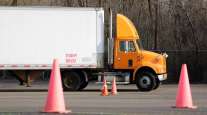Staff Reporter
Railroad Representatives Petition FMCSA for HOS Exemption

Two companies and a trade association representing railroad employees have petitioned the Federal Motor Carrier Safety Administration for relief from certain hours-of-service rules.
R.J. Corman Railroad Services, Cranemasters Inc. and the National Railroad Construction and Maintenance Association requested a five-year exemption from HOS rules regarding maximum driving time for drivers of property-carrying vehicles, according to a notice published in the Federal Register on March 8.
R.J. Corman, based in Kentucky, offers rail construction, signaling and emergency services. Cranemasters, based in Virginia, specializes in lifting equipment used for recovery efforts.
If granted, the exemption would apply to railroad employees — subject to HOS rules — who are responding to unplanned events that extend beyond normal work hours. This includes workers who haul equipment that is used to clear derailed or disabled trains or debris blocking train tracks. The exemption would pertain only to the time workers spend driving to the site of the event, which could involve a rail failure, electrical malfunctions, a bridge strike or a disabled vehicle on a track.
FMCSA-2019-04189 by on Scribd
The applicants note that many unplanned events occur outside normal business hours. According to the Federal Register document, more than half of the calls related to such incidents occur from 4 p.m. to 7 a.m. Furthermore, they said that local government officials are supposed to declare emergency HOS exemptions for responders and, because many of these events happen at odd hours, it is difficult to contact such officials to request an emergency declaration.
“A large number [of unplanned events occur] between midnight and 7:00 [a.m.], making it virtually impossible for the railroads to contact an official to request an emergency declaration before they request a contractor to respond to the unplanned event, and companies likely would not know if such an emergency declaration had been made before they respond to a call from a railroad,” the applicants state in the Federal Register notice.
The applicants compare the work of railroad employees who respond to emergencies to that of utility service employees who respond to similar situations and are exempt from HOS rules.

An R.J. Corman locomotive pulls cars across a railroad bridge. (R.J. Corman Railroad Group)
The companies also attest that they will maintain an equivalent or greater level of safety through measures such as convoys of escort vehicles in the front and rear of responding trucks and training for drivers to recognize fatigue. Two-way radios will be installed in all vehicles, which supervisors will use to check in with responders every 30 or 45 minutes. Also, drivers will have at least one hour before mobilizing in which they can stretch and exercise to stay alert.
“The applicants believe that the exemption, if granted, would not pose a safety risk since the drivers drive relatively short distances on public roads to get to the site of an unplanned event and do not drive after completing work at a site until requisite rest is obtained,” the document states.
FMCSA is welcoming public comment on the application through April 8.
The railroad groups are the latest in a long series of associations and companies that have sought exemptions from FMCSA. A group of trade organizations, including the National Cattlemen’s Beef Association, the Livestock Marketing Association, the American Farm Bureau Federation, the American Beekeeping Federation, the American Honey Producers Association and the National Aquaculture Association, requested to extend their driving limits in a Feb. 6 request.
FMCSA-2019-01276 by on Scribd
Several other groups, such as the American Bakers Association, the International Dairy Foods Association, the Association of American Railroads and the American Short Line and Regional Railroad Association filed requests Dec. 18 to relax HOS rules for drivers involved in emergency response activities.




